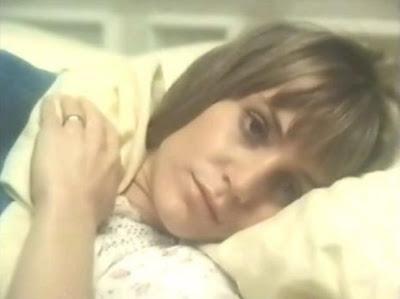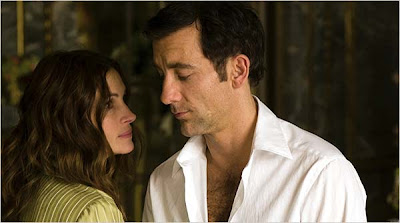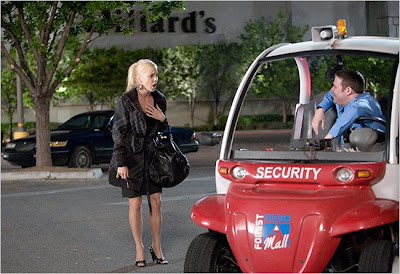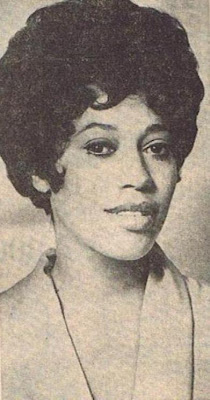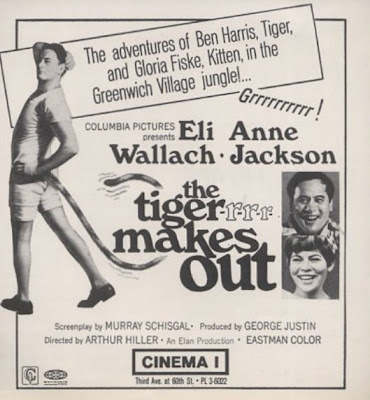
The Arthur Hiller cult film, "The Tiger Makes Out," written by Murray Schisgal and starring Eli Wallach and Anne Jackson, gets a rare showing this month.
Times flies when you're having fun. As difficult as it is to believe, Turner Classic Movies turns 15 this year. Happy Birthday! Or would that be Happy Anniversary? Who knows? So it's apt that Turner opens this month with a dual birthday celebration for MGM musical cohorts, Debbie Reynolds and Jane Powell, both of whom were born on 1 April.
You know, one thing is certain: It's difficult to image - or even remember - what life was like before TCM. Oh wait, I know ... We used to be able to see old movies in
theaters - in rep houses - or on college campuses.
But the video revolution put an end to all of that.
So, thank God for Turner Classics. Actually, the word "classics" is a misnomer because Turner's expansive library and free-thinking taste in film makes room for the sleeper, the cult film and the flop as well.
Let's start off with the latter - three musicals that were extremely popular in their day, much to my chagrin. They aren't flops in anyone else's eyes but mine. These views are strictly contrarian. So here goes.
All times, incidentally, are Eastern Time.

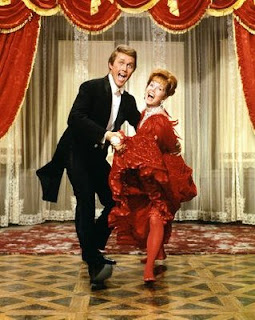
The dubious song-and-dance triumverate consists of Charles Walter's "The Unsinkable Molly Brown," George Sidney's "Bye, Bye Birdie" (that's star Janet Leigh above) and William Wyler's "Funny Girl."
"The Unsinkable Molly Brown," airing 3 p.m. on 1 April, is the usual MGM watering-down of a Broadway hit. (Metro only seemed to care about its original screen musicals.) Composer Meredith Willson, coming off Warners' hugely faithful film version of "The Music Man," must have suffered some kind of culture shock when he saw what Metro did to his "Molly," excising most of his sophisticated score.
Director Walters reportedly resisted Debbie Reynolds for the role of Molly, even though the role was made for her and even though she successfully starred for him in "The Tender Trap." Walters wanted Shirley MacLaine, who acted for him in "Ask Any Girl" and "Two Loves." But Debbie (above with leading man Harve Presnell) persisted and won the role, while MacLaine ended up doing J. Lee Thompson's "What a Way to Go!," an ever worse movie (from a Comden-Green script, no less).
What's confounding about the movie Molly Brown is how genuinely dislikable she is - alternately grasping and petulant, as she panders to nouveau-riche Americans and condescends to European royalty.
By the end of the film, I wanted her to, well, sink.
This is Debbie Reynolds' favorite role?
"Bye, Bye Birdie," being shown at 1 a.m. 30 April, has unfortunately become a new Turner staple. This is Sidney's Mickey Mouse version of a stage musical that was quite acerbic. The seemingly lovelorn Sidney quite literally turned his movie over to the grotesquely miscast Ann-Margret, sealing its fate as a particularly feeble adaptation of a stage musical.
Incidentally, in its new TV ads, Walmart has appropriated a singularly insipid song from the score, "How Lovely to be a Woman," which, from where I sit, is in a three-way tie with "I Feel Pretty" (from "West Side Story") and "I Enjoy Being a Girl" (from "Flower Drum Song") as the best example of the Broadway sexism that was rampant during the late 1950s.
Last and certainly least, there's
"Funny Girl," inexplicably picked by Alec Baldwin as a TCM Essential and airing at 8 p.m., 25 April. The play itself was Jule Styne's half-hearted attempt to rehash his "Gypsy" success, and while Barbra Streisand may have been mesmerizing in the play, on screen, she is overbearing and also extremely bad at lip-syncing her songs. (Her words and mouth are rarely together during the "Don't Rain on My Parade" number.) Sure, she can sing, but for lip-syncing, she should have studied Natalie Wood's precision in "West Side Story."
Getting back to Debbie, you'd to well to check out Curtis Harrington's difficult-to-see "Baby Jane" imitation -
"What's the Matter with Helen?" - with Reynolds and, yes, Shelley Winters as two Mama Roses with murder in their shared past. It shows at 5:15 p.m. on 1 April.
Turner devotes a night to three hilarious mockumentaries, the highlight of which is Albert Brooks' trailblazing "American Family" spoof,
"Real Life," at 9:30 p.m. 4 April. It is bookended by Woody Allen's
"Take the Money and Run" and Christopher Guest's
"Best in Show."Anthony Perkins takes center stage on 6 April, starting at 6 a.m. with
"The Actress," followed by
"Green Mansions," "Psycho," "Goodbye Again," "Five Miles to Midnight" and, ending at 3:45 p.m.,
"The Trial." I'm in for the day.
William Wyler's
"The Children's Hour" gets a double-airing - at 8 a.m. 7 April and at 6 p.m. 24 April - and while it's always rewarding to watch stars Audrey Hepburn and Shirley MacLaine in arguably their finest performances, this time keep an eye on those great old dames, Fay Bainter and Miriam Hopkins. Bainter, who received a well-deserved Oscar nomination, gives a Grande Dame performance that's riveting. When she screams,
"Silence, child!," you listen. Hopkins, meanwhile, is a hoot as an narcissistic, deluded diva who casually helps destroy her niece's life.
James Garner (above with Hepburn and MacLaine), making his first film outside of the Warner Bros. TV-&-film factory ("Maverick," "Darby's Rangers" and "Up Periscope") , is the very credible male lead here.
TCM, meanwhile, is
incredible. It never misses a trick, often paying tribute to filmmakers that even diehard buffs have overlooked and forgotten. Case in point: On 8 April, starting at 8 p.m., with
"The Little Fugitive," Turner will screen some of the films of the wonderful husband-wife team of Morris Engel and Ruth Orkin (often with an assist by Ray Ashley) - true renaissance artists whose strong independent style and raw verité approach to filmmaking (and in Ruth's case, still photography) predated the French New Wave. Two other titles by this powerfully influential team include
"Lovers and Lollipops" and
"Weddings and Babies," both excellent and both accompanied by a couple of compelling, must-see documentaries - one on Morris and one devoted to Ruth.
Critics seem to forget, but Arthur Hiller mades some very edgy comedies during the mid- to late-1960s, with 1967's
"The Tiger Makes Out," based on a screenplay by Murray Schisgal, possibly his most eccentric. Husband-and-wife team, Eli Wallach and Anne Jackson, fresh off of Schisgal's Broadway comedy, "Luv," star in this fractured tale of a demented postal worker, with delusions of grandeur, who hatches a kidnapping plot, hoping to ensnare a beautiful woman.
Broadway stalwarts Rae Allen, Bob Disney, David Burns and Sudie Bond co-star. "The Tiger Makes Out," airing at 4:45 a.m. 10 April, joins such other Hiller comedies as "The Hospital," "Popi," "The Wheeler Dealers," "The Out-of-Towners," "The Americanization of Emily," "The In-Laws" and "The Crazy World of Julius Vrooder" as representing a very defininte, very New York period in American fim comedy. Hiller's "Popi," starring Alan Arkin and Rita Moreno, will air on Turner in May.
The always unexpected Richard Fleischer crafts a different kind of Biblical epic - an anti-Biblical epic, if you will - with 1962's commanding
"Barabbas," starring the perfectly cast Anthony Quinn in the title role. A brooding, disturbing film, it airs 4:30 p.m., 12 April.
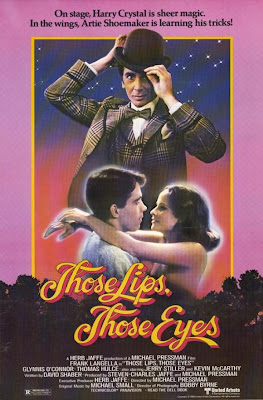
Alternately sentimental and cynical, Michael Pressman's
"Those Lips, Those Eyes," being shown at 12 a.m. on 14 April, is a minor classic that has been waiting nearly 30 years to be discovered. Released in 1980, the film is set in the world of summer stock, giving it a lulling, luxuriant ambience, and stars Frank Langella as a has-been ham who nevertheless exercises a certain hold over wide-eyed newcomers Tom Hulce and Glynnis O'Connor. (And whatever happened to
her?) For theater freaks, there are scenes and songs from lots of familiar shows here.
Pressman, meanwhile, was a promising filmmaker who debuted with the 1976 B-movie, "The Great Texas Dynamite Chase" and, later, made "The Bad News Bears in Breaking Training" and the gang film, "Boulevard Nights." "Those Lips, Those Eyes" was his fourth theatrical film (he also made "Like Mom, Like Me," with Linda Lavin and Kristy MacNichol, for TV) and he went on to do Richard Pryor's "Some Kind of Hero" and Dan Aykroyd's "Doctor Detroit," before seguing into TV work. By the way, Pressman's "Boulevard Nights" will be screened by Turner in May.
Arch Oboler's
"The Twonky," starring Hans Conreid, is an idiosyncratic curiousity about a college professor whose new-fangled gadget - his TV set - suddenly comes alive and takes over his life, dominating him.
Catch it at 2 p.m. on 15 April.
The ever-underrated Katharine Ross gets her own night on 18 April, starting at 8 p.m. with George Roy Hill's
"Butch Cassidy and the Sundance Kid," followed by Mike Nichols'
"The Graduate" and blacklisted Abrahma Polonsky's
"Tell Them Willie Boy Is Here" (which also features her "Butch Cassidy" co-star, Robert Redford).

Blake Edwards was hired to direct the film version of Harry Kurnitz's stage comedy,
"A Shot in the Dark," which starred Walter Matthau and Julie Harris on Broadway, while he was working on "The Pink Panther." He had so much fun with Peter Sellers on "Panther" that Edwards decided to slightly rewrite the Kurnitz play, inserting Sellers' Inspector Clouseau character into the hip, manic action.
Sophia Loren was originally scheduled to play the female lead but dropped out, as did Romy Schneider, Loren's first replacement. A very game Elke Sommer was Sellers' eventual co-star. "A Shot in the Dark," a very funny film (often better than "Panther"), airs at 8 p.m. on 19 April.
Ralph Nelson's
"Requiem for a Heavyweight," based on Rod Serling's much-filmed teleplay, shows up at 6 p.m. on 21 April. Pencil it in and savor the performances (and the fascinating contrasting acting styles) of Anthony Quinn, Julie Harris, Jackie Gleason and Mickey Rooney.
Ross Hunter was an actor before he turned to producing and he is amusingly cast opposite the delightful Judy Canova in
"Louisiana Hay Ride," directed by Charles Burton. Turner shows it at 9:30 p.m., 22 April

Carol Burnett, already a TV staple, made her feature-film debut in Danial Mann's Dino comedy,
"Who's Been Sleeping in My Bed?," and her outsized performance in the 1963 film pretty much stalled her movie career for about 10 years. (She would resurface in 1972 in Martin Ritt's pseudo-serious "Pete 'n' Tillie," with Walter Matthau.) Elizabeth Montgomery popped up here and in William Asher's "Johnny Cool" (also a '63 release) before heading to her "Bewitched" success. An appealing actress, she was probably too small for the big screen. Dino? He's hugely companionable as always. Watch him and the girls (including Jill St. John) at 10 p.m. on 23 April.
Highly recommended: Jay Sandrich's delightful update of the screwball comedy,
"Seems Like Old Times," starring the letter-perfect trio of Goldie Hawn, Chevy Chase and Charles Grodin. Neglected for almost 30 years now, this one deserves your attention. Howard Hawks would approve. Catch it at 10 p.m. on 24 April. (BTW, 1980 was a banner year for Hawn; she also make Howard Zeiff's "Private Benjamin.")

Someone at the New York Times who probably works on the features copy desk and occasinally write movie capsules once complained that Clint Eastwood
"sings like a moose" in Joshua Logan's
"Paint Your Wagon" (2 p.m., 25 April). Not so. Think about it: If Clint has such a soothing speaking voice, how can his singing voice sound like a moose? The hasty Times writer probably confused Eastwood with his co-star Lee Marvin who does sound like a moose - and is supposed to. Clint, on the other, gives near-definitive readings to his renditions of Lerner and Loewe's "I Still See Elisa" and "I Talk To The Trees." For the record, Eastwood has also sung in "Honkytonk Man," "Any Which Way You Can" and "Gran Torino." So there.
Now what can we do to get the Times to correct that pesky gaffe?
David Butler's 1950
"Tea for Two," starring Doris Day, Gordon MacRae and Gene Nelson, is the third screen version of Vincent Youmans' 1924 Broadway chestnut, "No, No Nanette." Why the title change? Why no mention of Youmans's show in the opening credits? Get the inside scoop from
Lou Lumenick's essential site. Meanwhile, see the film at 2 p.m. on 26 April. And, yes, that's the inimitable S.Z. ("Cuddles") Sakall, above, spying on Doris Day and Gordon MacRae in a scene from the film.
